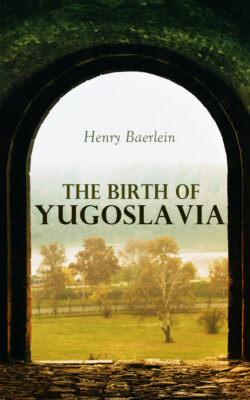Читать книгу The Birth of Yugoslavia - Henry Baerlein - Страница 80
На сайте Литреса книга снята с продажи.
THE SLAV VOICE IN MACEDONIA
ОглавлениеAssuredly the Omladina Society had some knowledge of affairs in Macedonia, for Dimitri Miladinoff, the elder of the two brothers, had been at Karlovci, where he was offered the professorship of Greek at the Serbian school. Miladinoff had been born at Struga in Macedonia and educated at Jannina, where he noticed that a number of the names of forests, rivers, villages and ruins sounded odd in Greek—they seemed to have much more resemblance to the language spoken by the Slavs who lived beyond his home, the Bulgars. This awoke a flame in him. At Ochrida, where he was presently appointed as a teacher in the school, he gave his lessons in the customary Greek, nor did he undervalue the advantages the Macedonian Slavs could draw, particularly at the stage they were in, from the study of Greek literature and from the contemplation of the patriotic virtues of old Greece. But at the same time he began to give his pupils a Bulgarian translation of what they were learning; and one day in 1845 while he was in the middle of a lesson, taught in that strange manner, on Thucydides, the Russian archæologist Grigorović appeared and in amazement cried, "But we are brothers!" It was to him a marvel that these people's mother-tongue was Slav. Miladinoff had a project to retain the Greek at college and to introduce Bulgarian in the elementary schools, but when in 1848 he spoke of this at Ochrida the notables had grown so hellenized that they considered an allusion to their Slav origin as most offensive. Far from giving up his plan, Miladinoff began a pilgrimage through Macedonia, pretending that his object was to gather funds for the construction at Constantinople of a Bulgar church. Everywhere he taught as he had done at Ochrida, and the elucidation, for example, of Demosthenes enabled him to plant his patriotic seeds. It was in the course of his travels that he (and afterwards his younger brother Constantine) collected the folk-songs that were published by the generosity of Strossmayer. He stayed for a time at Sarajevo and at Karlovci, where he was filled with emulation by the progress which the Serbs had made. On his return in 1857 to Macedonia the people of the town of Kukuš—near the future boundaries of Bulgaria, Serbia and Greece—invited him to be headmaster at their school. He was overjoyed that this town had the courage to have the Bulgarian language taught, and we have his reply. The Phanariote Greeks, he says, "will hurl their anathema against us! The Bulgarian script is contrary to God! It will not be the first time that they have proclaimed this! But those days are past! Already the rays of dawn. … " This letter is written in Greek. "Oh, how I am ashamed," he says, "to express my sentiments in the Greek language!" But the literary form of Bulgarian is, as yet, undeveloped. One year after his arrival at Kukuš the population removed the Greek books from their cathedral and listened to the singing of the Mass in Slav by a Bulgarian monk from Mt. Athos. When he began to recite the Credo in the ordinary Bulgarian tongue, the congregation fell on their knees and burst into tears.
